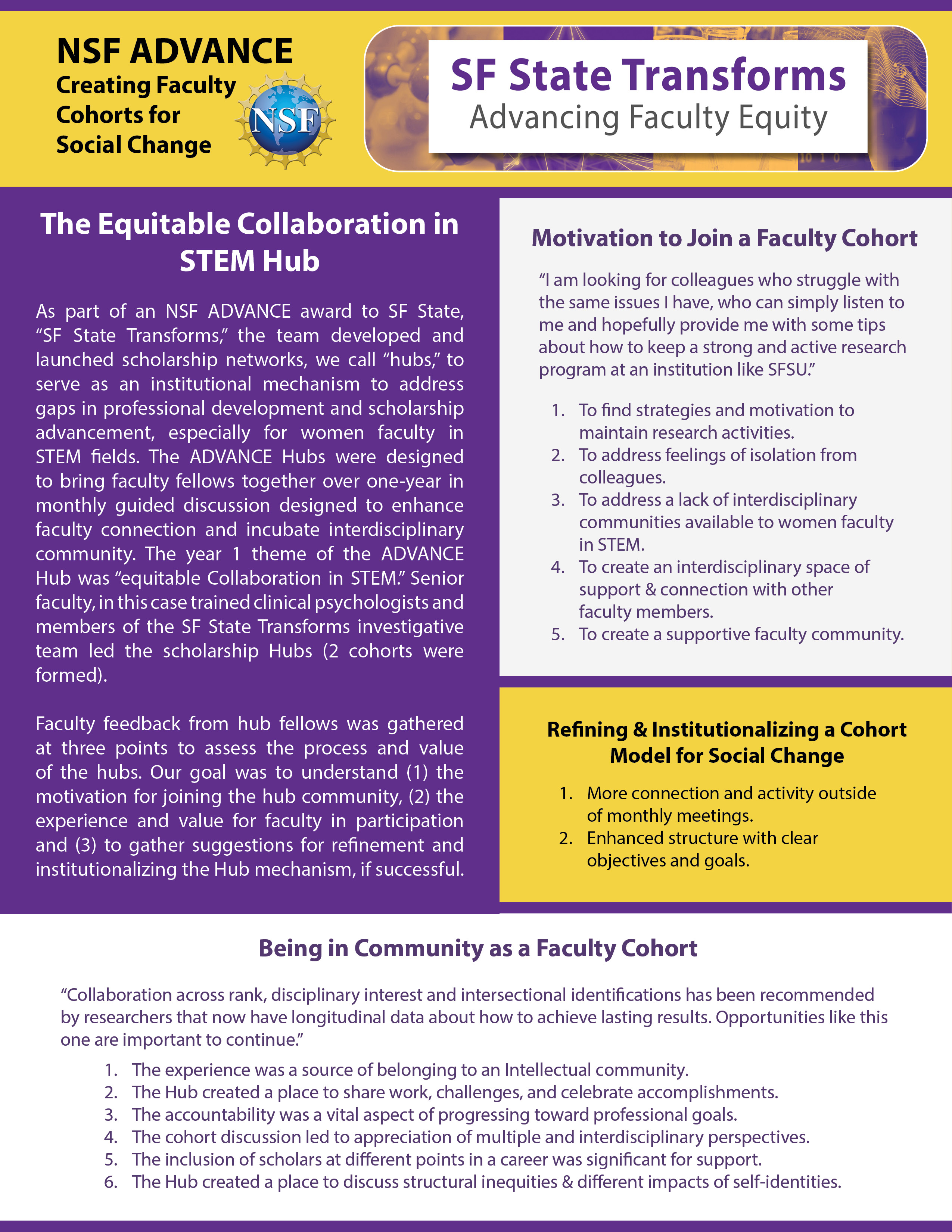2023-2024 ADVANCE Fellows
Ashmi Desai, Communications Studies (LCA)
Eileen Gonzales, Physics & Astronomy (CoSE)
Qun Wang, Computer Science (CoSE)
Alyssa Kubota, Computer Engineering (CoSE)
Juliana Parma, Kinesiology (HSS)
Supriya Misra Public Health (HSS)
Navi Kaur, Criminal Justice Studies (HSS)
Rochelle Jan Reyes, Public Health (HSS)
Cathy Samayoa, Biology (CoSE)
Angelica Camacho, Criminal Justice Studies (HSS)
Shubhi Sachdeva, Child and Adolescent Development (HSS)
2022-2023 Fellows: Building Solidarity and Community
Leia Bernardi Bagesteiro — Kinesiology, CHHS
Tiffany Caesar — Africana Studies, CoES
Jaime Chaves — Biology, CoSE
Luella Fu — Mathematics, CoSE
Marcela Garcia-Castanon — Political Science, LCA
Aakash Gautam — Computer Science, CoSE
Zubaida Qamar — Nutrition Sciences, CHHS
Shriti Raj — Computer Science, CoSE
Anusha Sundarrajan — Speech, languages, and hearing, CoE
2021-2022 Fellows: Equitable Collaboration in STEM
Leia Bagesteiro — Kinesiology, CHHS
Anoshua Chaudhuri — Economics, CoB
Dawn-Elissa Fischer — Anthropology, LCA
Valerie Francisco-Menchavez — Sociology & Sexuality Studies, CHSS
Melissa Hagan — Psychology, CoSE
Colleen Ingram — Biology, CoSE
Michelle Jungbluth — Estuary & Ocean Science Center & Biology, CoSE
Ornella Mattei — Mathematics. CoSE
Zena Mello — Psychology, CoSE
Ayse Pamuk — Urban Studies and Planning, CHSS
Charli Sakari — Physics and Astronomy, CoSE
Daphne Stannard — Nursing, CHHS
Building the ADVANCE Hub model
SF State faculty have reported little supports for scholarship and especially little support for interdisciplinary collaboration. In Year 1, the ADVANCE hub began with theme of Equitable Collaboration in STEM designed as a model to create structures of scholarship support for our faculty, starting with an intentional focus to meet the limited support for faculty scholarship that is collaborative, service-oriented, interdisciplinary and focused on social change.
Equitable collaboration in STEM held the goals to:
- Decenter the individual scholar as the privileged producer of knowledge, arguing instead for interdisciplinary and community-based collaborative scholarship.
- To lead with care and community-building and the values of equity — of position, voice, perspective, approach, and discipline.
- To addresses power relations and status hierarchies in ways that level power dynamics to work toward retain and promote leadership among white women and women faculty of color.
Year 2: Building Solidarity & Community
As COVID-19 in person transitions gathered momentum, faculty felt isolated and also in need of flexibility as they worked hard to "return" and continue.SF State Faculty Fellows in the ADVANCE scholarship hub reported the Hub impact as providing avenues for connection, problem solving, and building shared experience as they sought to navigate the challenges and opportunities as faculty. Transforms set the goal of Year 2 as building community to advance faculty in STEM as we refine and institutionalize the hub model.
Year 3: Building New Relationships, Fostering a Community of Care
Focus on retention - As economic austerity measures seem to be the default approach to lower enrollments among universities across the US, SF State faculty feel the pressure of further isolation as workloads increase and job satisfaction decrease with resources limited for most activities associated with scholarship and intellectual recognition. We chose to focus efforts on incoming and new faculty as retention emerged as a significant factor.
